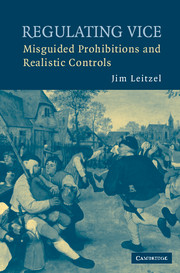Book contents
- Frontmatter
- Contents
- List of tables and boxes
- Preface
- Introduction
- 1 The Harm Principle
- 2 Addiction: Rational and Otherwise
- 3 The Robustness Principle
- 4 Prohibition
- 5 Taxation, Licensing, and Advertising Controls
- 6 Commercial Sex
- 7 The Internet and Vice
- 8 Free Trade and Federalism
- Conclusions
- Appendix: Vice Statistics
- References
- Index
3 - The Robustness Principle
Published online by Cambridge University Press: 06 January 2010
- Frontmatter
- Contents
- List of tables and boxes
- Preface
- Introduction
- 1 The Harm Principle
- 2 Addiction: Rational and Otherwise
- 3 The Robustness Principle
- 4 Prohibition
- 5 Taxation, Licensing, and Advertising Controls
- 6 Commercial Sex
- 7 The Internet and Vice
- 8 Free Trade and Federalism
- Conclusions
- Appendix: Vice Statistics
- References
- Index
Summary
MILL AND ADDICTION
John Stuart Mill's harm principle, as interpreted in Chapter 1, is consistent with extensive regulation of addictive substances and activities. Nevertheless, the harm principle rules out prohibition (backed by criminal penalties) of adult participation in vice, as well as prescription-only regimes for drugs. Regulations that are directly motivated at reducing adult engagement in vice also do not satisfy Mill's criterion.
Addiction and self-control shortcomings call into question the relevance or the appropriateness of the harm principle's application to vice. The harm principle will not apply, under Mill's own conception, if vice participants are not “in the maturity of their faculties,” or are “in some state of excitement or absorption incompatible with the full use of the reflecting faculty.” The harm principle perhaps should not be applied, even when Mill's preconditions are met, if “harms to self” inflicted upon vice participants are quite likely and significant. John Kaplan suggests that the harm principle is both inapplicable and unfitting in the case of drugs:
No nation in the world follows [Mill's] rule regarding self-harming conduct, and the rule is probably unworkable in a complex, industrial society – particularly one that is a welfare state. Mill's principle, moreover, seems singularly inappropriate when it is applied to a habit-forming, psychoactive drug that alters the user's perspective as to postponement of gratification and his desire for the drug itself.
- Type
- Chapter
- Information
- Regulating ViceMisguided Prohibitions and Realistic Controls, pp. 72 - 92Publisher: Cambridge University PressPrint publication year: 2007
- 1
- Cited by



